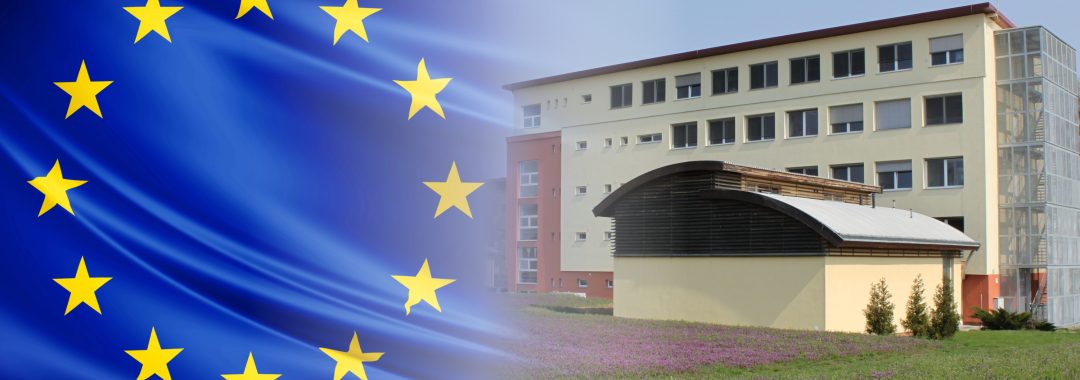On May 1, 2024, it marked 20 years since the Czech Republic joined the European Union, enabling the gradual access to financial resources from the European Structural and Investment Funds. These funds have been and continue to be utilised through Operational Programmes. One of the areas that has received financial support is research and development, which the Ministry of Education, Youth and Sports has implemented through the OP Research and Development for Innovation (2007-2013) and OP Research, Development, and Education (2014-2020). Currently, science is supported by OP The Johannes Amos Commenius.
The Veterinary Research Institute was founded in 1955, and the construction of its buildings took place between 1958 and1963. In the following period, partial building reconstruction and investments in innovative appliances were undertaken. With the Institute’s transformation into a public research institution in 2007, these possibilities were limited to establishing an internal fund for asset reproduction and relying on special-purpose grants provided by some providers, allowing partial equipment of the laboratories. To maintain the high methodological and technological standard of the facilities, it was essential for the Institute to participate in the calls of the Operational Programmes from the outset to secure financial support for infrastructural development.
The first project implemented was the "Centre for Advanced Microbiology and Immunology in Veterinary Medicine AdmireVet", which enabled a complete reconstruction of one of the three scientific buildings on the Institute's premises and two buildings belonging to the accredited experimental animal facilities. In the context of acquiring state-of-the-art technologies, such as a highly sophisticated flow cytometer or several mass spectrometers, not only was the technological level of the analyses significantly elevated, but it also notably contributed to improving the standards and safety of experiments conducted in microbiology, virology, immunology, and diagnostics. AdmireVet was followed by the project "Development of Research Capacity of the AdmireVet Centre", during which the infrastructure was enhanced with a cell sorter based on flow cytometry and a MALDI-TOF device facilitating the identification of bacterial species. In the same period, the Brno-wide project "CEITEC - Central European Institute of Technology" was implemented, where the Institute partnered in a consortium with Masaryk University, Mendel University in Brno, Brno University of Technology, Veterinary and Pharmaceutical University and the Institute of Physics of Materials of the CAS, v. v. i. The VRI was represented by the Department of Genetics equipped with a fluorescence confocal microscope.
The successful implementation of these three projects within the framework of the OP RDI was succeeded by other projects in the OP RDE programme. These were projects supporting the development of the scientific fields of pharmacology and toxicology in cooperation with the Faculty of Medicine and Dentistry of Palacký University in Olomouc. The projects "FIT - Pharmacology, Immunology and (Nano)Toxicology", "CEREBIT - Centre for Recombinant Biotechnology and Immunotherapy", "Immunopharmacotherapy" and "Immunopharmacology - Infrastructure Upgrade" have led to an increase in the technological level of techniques for the characterization of substances used in therapy, the definition of heterogeneous mixtures of substances and in vivo imaging techniques. The FIT project facilitated the establishment of a technology laboratory tailored for the specific production of selected substances in a defined environment.
Another project "Healthy Aging in Industrial Environment - HAIE" was based on cooperation with the Faculty of Medicine of the University of Ostrava and the Institute of Experimental Medicine of the CAS, v. v. i. The project focused on assessing the effects of selected environmental and lifestyle risk factors on the health and ageing of the population in the industrial region and beyond.
The project "Probiotic bacteria of gut microbiota as the basis of animal health and welfare" led to the isolation of pure cultures of bacteria from the digestive tract of poultry and pigs, their detailed characterization and subsequent production of probiotic preparations of defined composition.
The last project within the OP RDE programme period was "PROFISH - Sustainable production of healthy fish in various aquaculture systems", which enabled a significant renewal of technology, such as laboratory and breeding facilities of the research group Fish Diseases. In cooperation with Mendel University in Brno and the Faculty of Fisheries and Protection of Waters of the University of South Bohemia in České Budějovice, the project contributed to the understanding of some of the links between fish, their pathogens and the environment in which they live.
However, the development of the Institute was achieved not only thanks to operational programmes focused on scientific and infrastructural development, but also thanks to the Education for Competitiveness Operational Programme, which was aimed at the development of human resources in science. Additionally, the Operational Programme Environment played a significant role, facilitating the insulation of two science buildings and the installation of photovoltaic panels on the roofs of two buildings. These projects have thus contributed to reducing the energy consumption of the Institute's operations.
The above demonstrates that strategic and reasonable investment in research infrastructure and career development can yield the anticipated advancements in science and research. Thanks to these projects, the Veterinary Research Institute, as a research organization of the Ministry of Agriculture, is poised to fulfil its mission: to contribute to the sustainable development of livestock production through scientific endeavours, while adhering to a policy of prudent use of antibiotics and elevating standards within the livestock industry.


